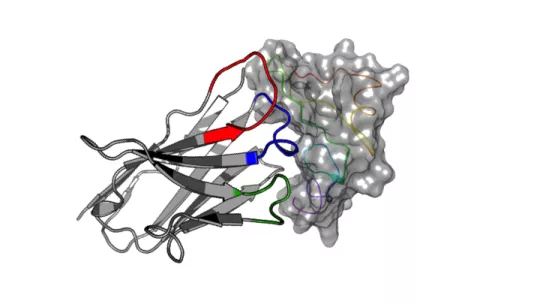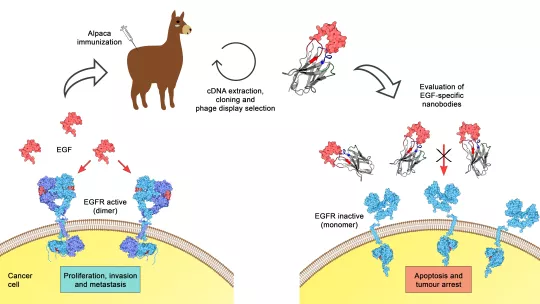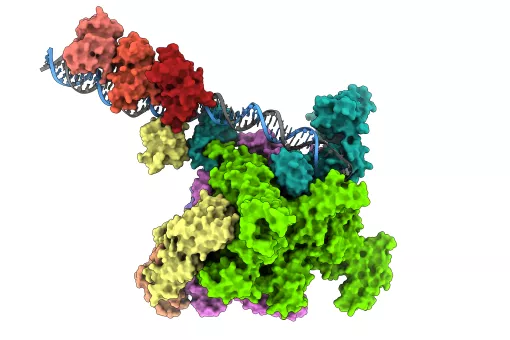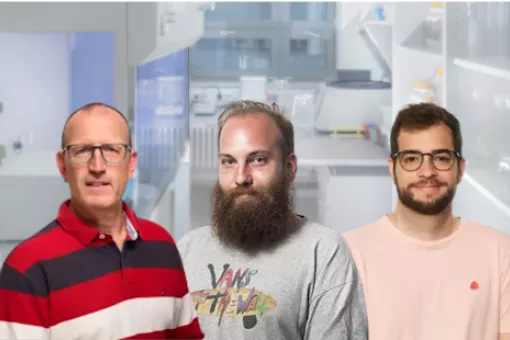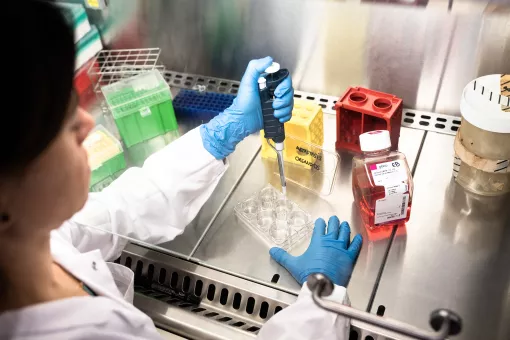Images
A study done at IRB Barcelona and the Vrije Universiteit Brussel identifies camelid nanobodies able to block EGF, a protein that is abundant in tumour cells and that helps them to proliferate.
The natural world often provides the answer to unsolved medical problems. On this occasion, the solution to a challenge posed by cancer has come about from the immune system of camelids. A study headed by the Institute for Research in Biomedicine (IRB Barcelona) and the Vrije Universiteit Brussel (VUB), in Belgium, describes a number of therapeutic tools that have the capacity to block the activity of EGF, a growth factor that is dysregulated in cancer cells.
EGF (Epidermal Growth Factor) is a therapeutic target in cancer; however, no inhibitors have been found for it to date. The team of researchers is the first to identify a family of nanobodies—antibodies that are exclusive to camelids—derived from alpacas that are effective against EGF. In this regard, they have described the molecular mechanisms underlying the affinity and selectivity of these nanobodies in an article published in the scientific journal Angewandte Chemie.
"In spite of advances in treatments against the EGR receptor (EGFR) in patients, their efficacy decreases over time because patients develop resistance," explain Monica Varese and Salvador Guardiola, co-authors of the study and postdoctoral researchers at IRB Barcelona. "By taking advantage of an emerging biotech tool, nanobodies, we have been able to synthesise the first inhibitors with high affinity for EGF," they say.
Immune response
IRB Barcelona produced the EGF protein and their Belgian colleagues administered it to alpacas. The immune response of these animals to this strange antigen produced a series of nanobodies, and the researchers identified a family of these molecules as potential inhibitors of EGF. The IRB Barcelona team, which has extensive expertise in molecular recognition between proteins, observed that some of the ligands showed high affinity and selectivity towards EGF, and, using a range of biophysical techniques, they characterized the interactions in cells in vitro and in human cancer cells.
"By injecting EGF into the alpaca we have challenged nature to find a molecule capable of binding tightly and with high selectivity to EGF, and it has come up with two very different but equally effective solutions for such a small and difficult antigen as EGF," says Ernest Giralt, head of the Peptide and Proteins Lab at IRB Barcelona and senior professor at the University of Barcelona, who has led the study.
These drugs could be useful for patients who develop resistance to the EGFR inhibitors currently on the market. The first step is now to evaluate the pharmacological effect of these new nanobodies in cell and animal models of cancer.
The study has been done in collaboration with Serge Muyldermans’ team, at the Vrije Universiteit Brussel (VUB) in Belgium and has received funding from the Ministry of Science, via ERDFs, and the Catalan Government.
Reference article:
Salvador Guardiola, Monica Varese, Macarena Sánchez- Navarro, Cecile Vincke, Meritxell Teixidó, Jesús Garcia, Serge Muyldermans, and Ernest Giralt
Anti-EGF nanobodies block EGFR activation via two distinct molecular recognition mechanisms
Angew. Chem. Int. Ed. (2018) doi: https://doi.org/10.1002/anie.201807736
If you like to know more about Ernest Giralt's research laboratory, watch the Meet Our Scientists Video Ernest Giralt: "The power of medicinal chemistry"
About IRB Barcelona
The Institute for Research in Biomedicine (IRB Barcelona) pursues a society free of disease. To this end, it conducts multidisciplinary research of excellence to cure cancer and other diseases linked to ageing. It establishes technology transfer agreements with the pharmaceutical industry and major hospitals to bring research results closer to society, and organises a range of science outreach activities to engage the public in an open dialogue. IRB Barcelona is an international centre that hosts 400 researchers and more than 30 nationalities. Recognised as a Severo Ochoa Centre of Excellence since 2011, IRB Barcelona is a CERCA centre and member of the Barcelona Institute of Science and Technology (BIST).

